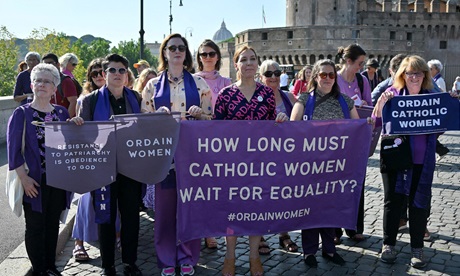What is it with the Roman Catholic Church and women? It’s not as if they just arrived on the scene and need to be integrated into the life of the Church. In fact, they are the life of the Church.
It is the women who predominantly do the heavy lifting of Catholic life; they educate, research, facilitate, spiritually nourish and sustain the regular rhythms of Catholic religious practice.
And, yet, the hierarchy of the Curch needs to justify and validate their presence and gifts by writing documents about their irreplaceable charisms or feminine genius, their mystery and mystique, their call to complementarity.
The Church leadership does this because it sees the clamouring for the inclusion of women in its sacramental ministry as both a rupture with theological tradition and as a threat to its universal unity.
So when the issue of women in the diaconate surfaced at last year’s first session of the Synod on Synodality, it was not a surprise nor particularly welcomed. But it wasn’t banned either.
There was a genuine expectation among many that the subject would resurface during the second session – currently unfolding in Rome. But Pope Francis, fearing its contentiousness would detract from the larger agenda of the synod, sought to defang the matter.
He set up a study group to look at the issue and placed oversight in the hands of fellow Argentine and trusted theologian Victor Manuel “Tucho” Fernandez.
Understandably, many concluded that the Pope was shelving an issue that remains for many Catholics a subject of urgency. But that interpretation, in my view, misreads Francis’s intention.
This unique synod constitutes the high point of his papacy; it is establishing a new way of functioning as a Church built on the pillars of deep listening, respectful dialogue and openness to others, a model of social behaviour and governance that could be the Church’s gift to a fractious world.
Allowing debates around women and holy orders would compromise what Francis wants the synod to accomplish.
Still, the issue isn’t going away. It needs to be addressed fully, transparently and with integrity. Francis’s narrative about women and their place in the Church is a potent blend of the platitudinous and the pious. And it is unpersuasive.
So where do we go?
In the 19th century, when the doctrine of papal infallibility was in the process of being formally declared as dogma at the First Vatican Council, there were bishops and thinkers who, though not technically dissenting from the teachings, felt for various reasons that the Council wasn’t the right place to handle the matter.
They were called the Inopportunists.
Well, I am an opportunist in that I think the role of women in ordained ministries – deacon and priest – is not best served or aired in the current synod. We need to do some serious institutional scouring beforehand.
The primary concern must remain the scourge of clericalism and how we practically and methodically establish structures that confirm its erasure. Clericalism is a perversion of the priesthood resulting not in a selfless ministry of service but in entitlement. It is an abuse of power. Read more
- Michael W. Higgins is the Basilian Distinguished Fellow of Contemporary Catholic Thought at the University of Toronto’s St. Michael’s College. His latest book is The Jesuit Disruptor: A Personal Portrait of Pope Francis.
News category: Analysis and Comment.




